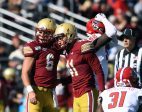Sports wagering isn’t yet legal in Massachusetts. But in anticipation of that changing, presidents and athletic directors of eight universities in the state are pushing policymakers to ban betting on college athletics.

In a letter to House Speaker Robert DeLeo, several university heads said freezing out betting on college competitions is necessary to preserve integrity. Those cited in the letter include Senate President Karen Spilka, and the lawmakers working on sports betting legislation in the Bay State, academic and athletic leaders from Boston College, Boston University, Harvard University, Northeastern University, The College of the Holy Cross, Merrimack College, and the University of Massachusetts Amherst and Lowell.
We recognize that during the current difficult economic climate, the Legislature desires to develop new sources of revenue, including sports wagering. But like other states, Massachusetts can gain those benefits without legalizing college sports betting,” the letter stated.
Just two institutions in the state — Boston College and UMass-Amherst — play both Division I basketball and in the Football Bowl Subdivision (FBS). However, a slew of Bay State schools, including Harvard, Holy Cross, and Northeastern, play Division I men’s basketball, which is one of the most wagered-on sports in the US.
Work in Progress
Currently, in New England, only New Hampshire and Rhode Island permit sports wagering. But Massachusetts is seen as the region’s crown jewel because it’s the largest state in the area and the only one with professional franchises from Major League Baseball, the NBA, NFL, and the NHL.
Although sports betting in the Bay State is largely viewed as a “when,” not “if,” matter, the timeline for legalization got murkier when in July, a related proposal was stripped from an economic development package. Analysts believe that effort was ill-timed, and that with existing political support, the issue could be revisited and passed as soon as early 2021.
Despite political delays, gaming companies ranging from homegrown DraftKings to the operators of the state’s three casinos — MGM Resorts, Penn National Gaming, and Wynn Resorts — remain enthusiastic about the Massachusetts sports betting market.
Familiar Call
As sports betting gained legitimacy in the US over the past two years, it’s not uncommon for universities or states themselves to take hard lines against wagering on athletics.
Last year, some colleges in Indiana and Pennsylvania, two of the fastest-growing sports betting markets in the country, forbid staff, students, and players from wagering on NCAA games. The Oregon Lottery doesn’t offer users of its “Scoreboard” mobile betting app action on any college tilts.
Other states approach betting on colleges in different, though still restrictive, ways. For example, New Jersey sportsbook operators can offer action on college games, but they can’t accept bets on games played in the Garden State or out-of-state games involving universities from the state.
As for Massachusetts, if the state proceeds with prohibiting betting on NCAA games, the financial impact remains to be seen. But it would take some compelling games off the table for bettors. As a member of the Atlantic Coast Conference (ACC), Boston College occasionally faces Clemson and Florida State in football and Duke and North Carolina in basketball.
The post Massachusetts University Leaders Tell State to Ban College Betting appeared first on Casino.org.
Via Casino.org https://www.casino.org/news